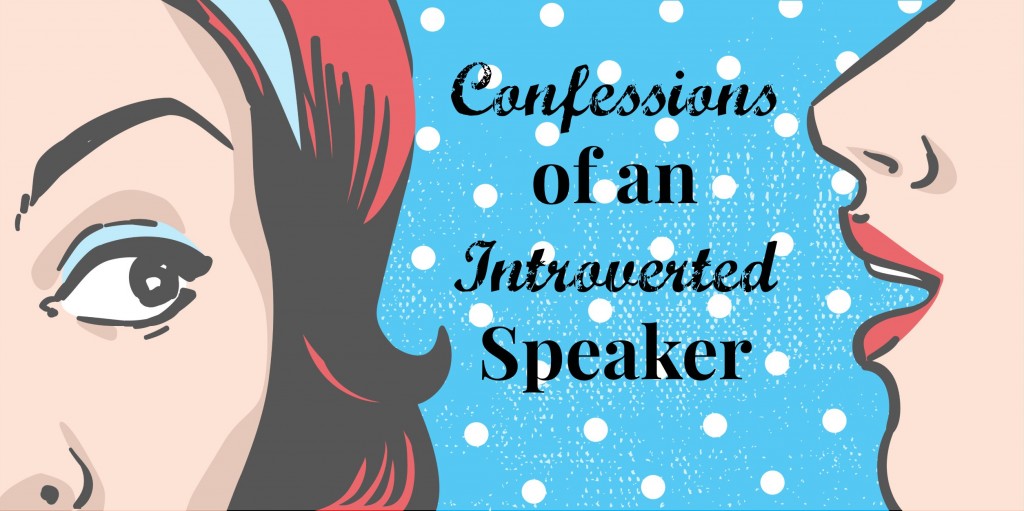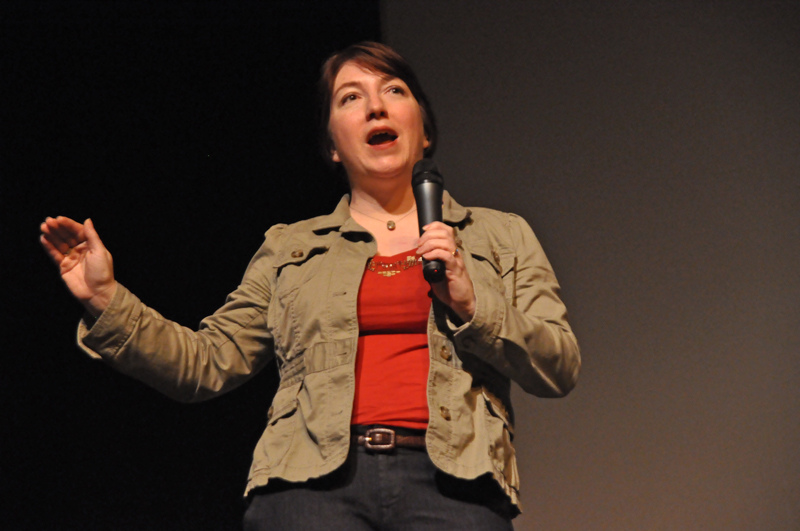Confessions of an Introverted Speaker
 I've proudly proclaimed that Introverts do indeed make the best speakers. Now, I am over-the-moon to bring you this 2-part interview with Beth Buelow of The Introvert Entrepreneur.
I've proudly proclaimed that Introverts do indeed make the best speakers. Now, I am over-the-moon to bring you this 2-part interview with Beth Buelow of The Introvert Entrepreneur.
Beth is a speaker, author and professional coach who helps Introverts amplify their strengths. Today, she wants to help you amplify your strengths as an introvert speaker. She'll chat about her strengths, challenges and how she trained to be an in-demand public speaker.
Table of Contents
- 1 Why don't we start off with you telling us a bit about yourself and why you started the Introvert Entrepreneur?
- 2 What challenges do you face as an introverted speaker?
- 3 Susan Cain author of “Quiet” has talked openly about how public speaking is a huge struggle for her. Since you do a lot of presentations, how did you develop your public speaking skills?
- 4 What strengths do you think introverts have as speakers?
Why don't we start off with you telling us a bit about yourself and why you started the Introvert Entrepreneur?
I’m a Midwestern gal who, along with her husband, decided 6 ½ years ago to find new adventures in the Pacific Northwest. I brought with me experiences of being a musician, a writer, a nonprofit professional, and knowing how to drive in the snow. All of those experiences are still relevant (except for the snow driving, thank goodness!), even though I’m doing something that on the outside looks completely different.
When we moved, I thought I was going to go a traditional job route. Instead, a serendipitous meeting with a small group of fabulous professional coaches set me on a completely different but not out-of-character path. I started coach training in 2008 and finished in late 2009. It was finally May 2010 when I realized that I was primarily attracting introverted clients, and The Introvert Entrepreneur was born. As an introvert myself, I created a coaching relationship that was spacious and in tune with their particular ways of processing and moving about in the world. It also resonated with my long-standing interest in personality typing and psychology, as well as my tendency to root for the (real or perceived) underdog.
What challenges do you face as an introverted speaker?
Here’s what’s true for me: when I’ve been engaged to give a presentation, I have to perform, whether I feel like it or not. My presentation is at a certain time, on a certain day, and I have to push through my mood or energy level to fulfill expectations (both my own and my audience’s).
I can imagine an extrovert might identify with those feelings, but in the case of introverts, we are much more aware of the expenditure of energy that happens when we get up in front of a group. If we’re running on low before we even take the stage, we don’t have much in the way of reserves to draw on. That said, if I have taken adequate care of myself beforehand, it’s possible that I will be energized by the group, at least as long as I’m in front of them. But when it’s over, I’m usually ready to crash. It’s like any adrenaline high I had going for me when I was talking rushes out of my body as soon as I step off stage, and being fully present for post-speech conversations is doubly-challenging.
Another interesting challenge is my tendency to want to share too much content. Think about it: I’ve been given the stage and a microphone, and all eyes and ears are on me. And I have a lot to say! I’m passionate, and hey, I have the floor, so good luck shutting me up! I think it’s my one chance to speak up, so I’d better say it all. What keeps me from falling into that trap (most of the time) is remembering something I heard a few years ago: don’t tell them everything you know, tell them what they want to know. What’s a cool fact or story to me might not be the most important thing they want to know. And it only distracts or takes valuable time away from the core message. So I try to strip it down to bottom line, audience-focused information and keep the content lean. It’s not easy. I can get carried away. But in service of both the audience and my energy, it’s important to try.
By doing a lot of presentations! Each time I present, I get that much more comfortable with my expertise and personal speaking style. I feel lucky, because I find it very comfortable to be in front of a group of people sharing information. I can remember a few instances of feeling some anxiety, especially the first time I was in front of a few hundred people (in my case, a Rotary club, which is a wonderful and forgiving audience for newbie speakers). But generally, because I aim to keep my focus on the message and not on me, I experience virtually no nervousness on stage.
I attribute my ease to my training as a classical musician. From sixth grade through graduate school, I was constantly performing. And it wasn’t just about the act of being in front of people; it was about being judged, critiqued, and applauded on a regular basis. I learned how to accept a wide range of feedback. I also learned how to recover from mistakes. When you’re on stage, a mistake will happen. It’s almost inevitable. So the problem isn’t the mistake itself; it’s how you recover from it. I also remember saying to my teacher before a recital: “I’m nervous.” He said, “Have you practiced? Are you prepared?” “Yes.” “Then there’s no reason to be nervous.”
All of those years of succeeding, failing and learning through music have transferred to my speaking. Plus, I used to get very nervous performing, so I think I experienced a lifetime’s worth of anxiety by the time I was 23! Now, at 42, I have a certain trust that I can handle whatever happens.
What strengths do you think introverts have as speakers?
Introverts tend to be thoughtful and go deep on a subject. They develop an expertise that goes beyond the surface level, which means they strive to bring meaningful messages to the stage. They keep the focus on the message, not themselves. But more than that, I think the strength for introverts lies in the public speaking platform itself. Introverts might avoid public speaking because their experiences of speaking out have been challenging. They often have to fight to be heard, or they feel like there’s not enough space to think or prepare before sharing their thoughts.
When you think of traditional public speaking situations, those challenges are removed. Instead, they have a tremendous amount of control. They have been given the floor. People either want to or have to listen to them. They get to manage the pace and energy of the communication. They are most often speaking about something they feel strongly about. They have a chance to prepare and think through carefully what they want to say. And there’s an efficiency to public speaking that I think introvert entrepreneurs can appreciate. Instead of telling your story to 50 people individually over the course of a few months, you get to say it to those 50 people all at once. It’s a concentrated blast of energy output, rather than a steady leak that slowly depletes your batteries.
Here are my (Dr. Michelle's) big a-ha's from Beth:
- Introverts love to go deep on their topic, but could share too much information and overwhelm the audience
- Practice and experience is key to becoming an excellent speaker (true for introverts, extroverts and us ambiverts)
- You have a ton of control in traditional public speaking setting – use those to your advantage
Next week, we'll chat about how Beth approaches preparing a presentation, what she does moments before stepping on stage and how she takes care of herself after the big presentation.
What resonated with you about Beth's thoughts on intoverts and speaking? Tell me about in the comments!
Beth Buelow was 7 when she outlined the marketing plan for her first entrepreneurial venture, 23 when she learned she was an introvert, and 38 when, in 2010, she put the two together to create The Introvert Entrepreneur. Her message resonates with introverts who want to amplify their strengths, and the extroverts who want to understand why introverts are so doggone quiet. Beth is a professional coach, author and speaker, is based in the Pacific Northwest and serves introverts worldwide. She is the author of “Insight: Reflections on the Gifts of Being an Introvert” (2012) and “I is for Introvert: The A-Z Guide to the Quieter Side” (2013). Learn more at TheIntrovertEntrepreneur.com.



Hi Michelle, the biggest thing that I took away from Beth’s advise was “don’t tell them everything you know, tell them what they want to know. What’s a cool fact or story to me might not be the most important thing they want to know”. I enjoy your valuable tips, Thanks, Mike
You’re welcome Mike! I loved Beth’s point too about not brain dumping on your audience. Thinking carefully about what your audience needs to know and delivering exactly that to them.